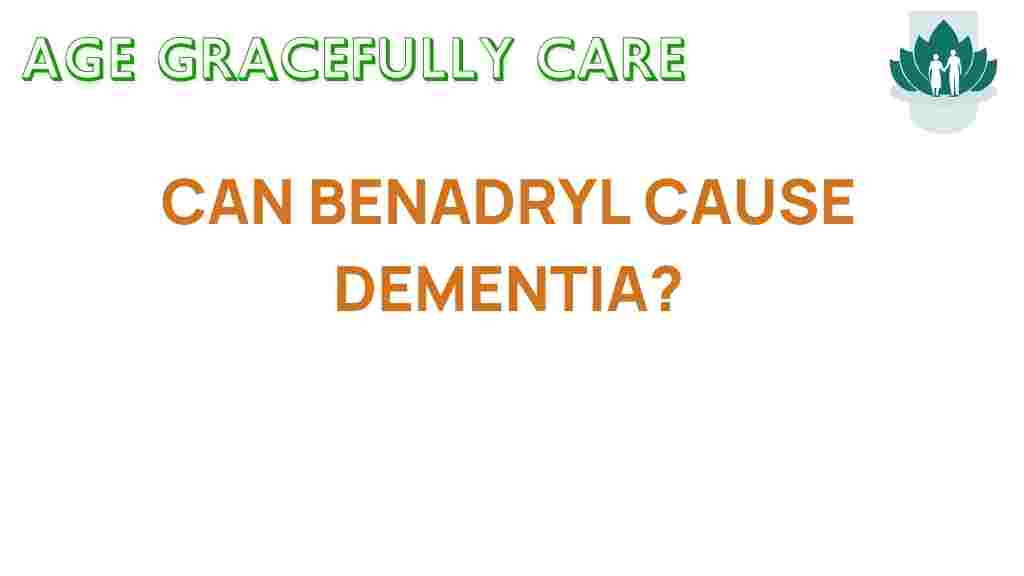The Surprising Link Between Benadryl and Dementia: What You Need to Know
Benadryl, a popular over-the-counter antihistamine, is widely used to relieve symptoms of allergies, hay fever, and the common cold. However, recent studies have raised concerns regarding its long-term effects, particularly in relation to cognitive decline and dementia. As we delve into this crucial topic, it’s essential to understand how medications like Benadryl may impact brain health, especially in the elderly population. This article will explore the connections between Benadryl, dementia, and other health risks to help you make informed decisions about your health and that of your loved ones.
Understanding Benadryl and Its Uses
Benadryl, known generically as diphenhydramine, is an antihistamine that works by blocking the effects of histamine in the body. It is often used to treat:
- Allergic reactions
- Insomnia
- Motion sickness
- Cold symptoms
While it is effective for these conditions, it is crucial to consider the potential side effects, especially for elderly patients who may be more susceptible to certain health risks.
The Link Between Benadryl and Cognitive Decline
Research has increasingly suggested a link between the use of anticholinergic medications, including Benadryl, and cognitive decline. Anticholinergics work by blocking acetylcholine, a neurotransmitter associated with learning and memory. Studies have shown that long-term use of these medications may increase the risk of dementia, including Alzheimer’s disease.
Some key findings include:
- A study published in the journal JAMA Internal Medicine found that older adults who used anticholinergic drugs had a higher risk of developing dementia compared to those who did not.
- Another study indicated that prolonged use of antihistamines can lead to significant memory loss and cognitive impairment.
Given these findings, it is essential to be cautious about the use of Benadryl, especially among the elderly.
Health Risks Associated with Benadryl
While Benadryl can be effective in treating allergy symptoms, it also comes with potential health risks, particularly for older adults. Some of the risks include:
- Increased risk of falls and fractures due to sedation and dizziness.
- Confusion and memory impairment, which can exacerbate existing cognitive decline.
- Potential interactions with other medications that may further impact cognitive functions.
It is essential to discuss any medications with a healthcare provider, especially for elderly care, to minimize these health risks.
Recognizing Symptoms of Cognitive Decline
Understanding the signs of cognitive decline is crucial for early intervention. Some common symptoms include:
- Forgetfulness, especially regarding recent events or conversations.
- Difficulty in planning or solving problems.
- Confusion about time or place.
- Withdrawal from social activities or loss of interest in hobbies.
If you notice these symptoms in yourself or a loved one, it is vital to consult a healthcare professional.
Step-by-Step Process: Assessing Medication Use
To better understand the risks associated with Benadryl and other antihistamines, follow this step-by-step process:
- Review Current Medications: Compile a list of all medications being taken, including over-the-counter drugs.
- Consult a Healthcare Provider: Discuss the necessity of each medication, especially antihistamines like Benadryl.
- Consider Alternatives: Inquire about alternative treatments for allergies or insomnia that carry less risk of cognitive decline.
- Monitor Symptoms: Keep track of any changes in cognitive functions or overall health when using these medications.
Tips for Managing Allergies Without Benadryl
Managing allergies without relying on Benadryl is possible by considering the following alternatives:
- Saline Nasal Sprays: These can help relieve nasal congestion without the side effects of antihistamines.
- Non-sedating Antihistamines: Medications such as loratadine (Claritin) and cetirizine (Zyrtec) may be safer options.
- Allergy Shots: Immunotherapy can provide long-term relief from allergies.
What to Do If You Experience Memory Loss
If you or a loved one experiences memory loss or other cognitive issues, consider the following steps:
- Schedule a Medical Appointment: A healthcare provider can conduct assessments to determine the cause of memory loss.
- Review Medications: Discuss with your doctor any medications that may be contributing to cognitive decline.
- Engage in Mental Exercises: Activities such as puzzles, reading, and learning new skills can help improve cognitive function.
Conclusion: Making Informed Decisions About Benadryl and Dementia
The connection between Benadryl and dementia raises significant concerns for those using this medication, particularly the elderly. While Benadryl can effectively manage symptoms of allergies and cold, its potential impact on cognitive function cannot be overlooked. It is vital to consult healthcare professionals about the risks associated with long-term use of antihistamines and to explore safer alternatives for managing allergies. By staying informed and proactive, you can make the best decisions for your health and well-being.
For more information on cognitive health and medications, visit Alzheimer’s Association.
This article is in the category Health and created by AgeGracefullyCare Team
